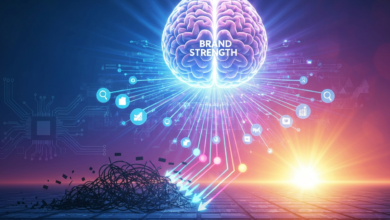Human-Led, Agent-Powered: The Future of SEO Teams

▼ Summary
– The narrative around AI replacing human jobs is often exaggerated, with roles transforming rather than disappearing entirely.
– SEO job listings remain resilient, with mid-level roles making up nearly 60% of positions, indicating a shift in skill demands rather than decline.
– SEO professionals should focus on using AI as a tool to amplify their impact, not fear replacement, by leveraging automation and intelligent systems.
– SEO teams are evolving toward leaner, more versatile structures that prioritize capabilities over specialized roles and integrate cross-functionally.
– The future of SEO involves collaboration between humans and AI agents, with agents handling repetitive tasks and humans focusing on strategy and business outcomes.
The future of search engine optimization lies in a powerful new model: human-led, agent-powered teams. While headlines often paint a picture of artificial intelligence replacing jobs, the reality for SEO is far more collaborative and transformative. Economic shifts and technological advances are reshaping roles, but the core function of driving organic growth remains critically important. The most successful organizations will be those that strategically blend human expertise with AI-driven automation to achieve unprecedented scale and impact.
Discussions about AI’s role in the workforce frequently center on replacement theory, suggesting widespread job losses across various sectors. Research from Stanford’s Digital Economy Lab indicates a 13% employment decline for early-career workers in roles most exposed to generative AI. This concern has extended to white-collar professions, with predictions of significant restructuring over the coming years. However, this perspective often overlooks the complex factors at play, including economic conditions and market corrections following a period of rapid hiring. As talent expert Josh Bersin notes, predictions of mass job destruction tend to be exaggerated. The more likely outcome is not elimination but evolution, with roles transforming to incorporate new technologies.
Within the SEO field, similar transformations are underway. The familiar declaration that “SEO is dead” proves as inaccurate as ever. While the composition of SEO teams is changing, with fewer leadership roles and a contraction in specialized content and technical positions, the discipline itself is thriving. Job listings for SEO professionals remain strong, with mid-level roles constituting nearly 60% of current openings. The field isn’t disappearing; it’s demanding new capabilities. Instead of questioning whether AI will replace them, forward-thinking SEO professionals should ask how they can leverage AI to dramatically increase their effectiveness.
Think of AI not as a replacement but as an amplifier, the difference between using a standard hammer and operating a powerful jackhammer. SEO specialists who master AI tools, automation systems, and intelligent agents will deliver results with greater speed and impact than previously possible. Bersin emphasizes that “AI is a tool. We can make it or teach it to do whatever we want…Life will go on, economies will continue to be driven by emotion, and our businesses will continue to be fueled by human ideas, emotion, grit, and hard work.”
The industry narrative around SEO needs refreshing. Too much focus remains on what’s being lost, clicks, visibility, control. This outdated perspective fails to capture the current reality. The conversation should center on amplification and revenue generation. SEO has matured from simply chasing rankings to driving measurable business growth through organic discovery channels, whether traditional search results, AI Overviews, or the emerging field of Generative Engine Optimization (GEO).
AI serves as a powerful force multiplier in this context. When implemented effectively, it scales analytical capabilities, accelerates testing cycles, and directly connects SEO efforts to meaningful business outcomes like pipeline development, conversion rates, and revenue growth. The goal isn’t to resist technological change but to demonstrate how AI-enhanced SEO strategies can accelerate business success faster than ever before. The new vocabulary for SEO focuses on impact rather than survival.
Team structures have already begun their transformation. Where marketing departments previously expanded headcount to increase output, current conditions demand different approaches. Hiring pauses, tighter budgets, and questions about SEO’s function in an AI-influenced landscape require leaders to reconsider organizational design. Recent industry reports show remote SEO opportunities dropping to 34% of listings, while content-focused positions declined by 28%. Another survey noted a 37% reduction in SEO job postings compared to the previous year.
These trends highlight two significant developments: specialized positions are consolidating into broader strategic roles, and organizational leadership increasingly prioritizes return on investment per team member over simple headcount numbers. Success now depends on capability rather than personnel quantity.
SEO leadership requires fresh thinking. Traditional hierarchical structures no longer suffice in this environment. Modern search teams need flexibility, rapid execution, and seamless integration with analytics, user experience, paid media, and content development. Forward-thinking leaders build teams around necessary capabilities rather than predefined job titles.
The most effective SEO organizations prioritize aptitude over specialization. They seek professionals who can think across disciplines rather than operating within narrow silos. The most valuable hires aren’t necessarily technical experts focused solely on crawl analysis or schema markup. They’re problem solvers who understand how search integrates with the broader growth engine and have experience expanding impact across content, data, and product development.
Progressive leaders are also reconsidering resource allocation. The conventional approach of pairing technical SEOs with engineering support is evolving toward technical SEOs collaborating with AI product managers and developing custom solutions. This updated model enables faster iteration, more ambitious testing, and systems that deliver tangible business results.
For SEO leaders, reimagining team architecture becomes essential. The crucial question shifts from “Who should I hire next?” to “What critical capability must we master to maintain competitiveness?” Once identified, structure both human talent and AI agents around addressing that need. Organizations that navigate this transition successfully will establish the standards for next-generation search leadership.
The emerging paradigm features human-led, agent-empowered teams working in concert. These agents represent AI-enabled systems such as automated content refreshers, site-health monitoring bots, or citation-validation tools that operate alongside human experts. The human role involves defining objectives, training systems, monitoring performance, and ensuring quality assurance.
This partnership matters because agents manage high-volume, repetitive tasks, content generation, basic auditing, link-score filtering, freeing humans to concentrate on strategy development, insight generation, and business impact. Developing these AI systems represents a significant investment, with costs ranging from $20,000 to $150,000 depending on complexity, integration requirements, and specialized work across data science, engineering, and quality assurance teams.
A single human manager might oversee 10-20 agents, transforming traditional organizational structures toward the “short pyramid” or “rocket ship” model described by Tomasz Tunguz. The future belongs to teams built around this combination of empowered humans and capable agents.
Practical applications already demonstrate this approach:
SaaS organizations might develop custom onboarding agents that process product information, create landing pages, and conduct preliminary SEO audits, with human strategists refining the output.
Marketplace brands could implement audience discovery agents that analyze customer and marketplace information, while human teams craft the narrative and establish strategic direction.
Enterprise content operations might deploy content refresh agents that identify high-performing pages, recommend improvements, and generate draft updates for editorial review and finalization.
Successful integration proves crucial. These modern teams achieve their potential when they avoid operating in isolation. The SEO/GEO unit must collaborate closely with paid search, analytics, revenue operations, and user experience teams, functioning as partners rather than service providers. Agents create capacity; humans create alignment and amplification.
Building the future SEO community demands adaptation. The current pace of change has created problematic reliance on third-party AI tools as solutions to uncertainty. However, genuine AI advancement begins internally rather than through external subscriptions. If the only artificial intelligence in your workflow comes from purchased products, you’re surrendering competitive advantage. The future favors teams that build custom solutions rather than simply buying off-the-shelf options.
Practical starting points include developing proprietary agent frameworks with human oversight to ensure accuracy, adaptability, and brand consistency. Partner with experts who co-create solutions rather than simply delivering finished products. The most valuable collaborations teach your team how to manage and scale agents independently. Evolve your organizational structure beyond traditional pyramids toward the “rocket ship” model where humans and agents work together to multiply output, insights, and business outcomes.
The next chapter of SEO begins with constructing more intelligent teams. It combines human guidance with agent execution. It focuses on capability enhancement. Those who lead this transformation won’t just adapt to the evolving search landscape, they’ll actively design its future.
(Source: Search Engine Land)





